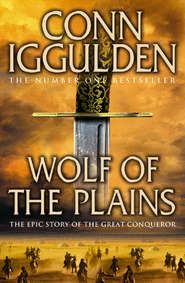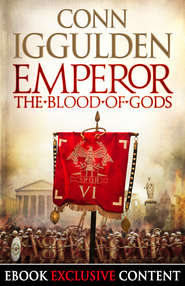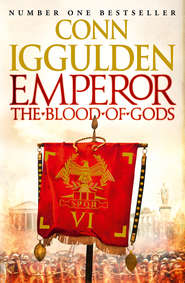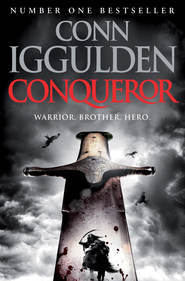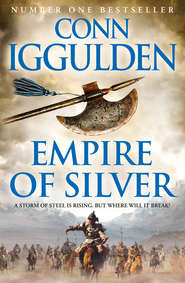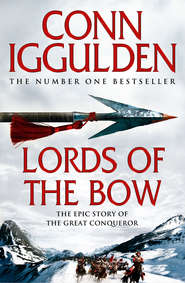По всем вопросам обращайтесь на: info@litportal.ru
(©) 2003-2024.
✖
The Emperor Series Books 1-5
Автор
Год написания книги
2018
Настройки чтения
Размер шрифта
Высота строк
Поля
‘I will be here,’ he said.
The pattern along the coast suggested the next settlement would be further than the soldiers could march in a day. They made better time when they crossed the tracks of heavy animals and could follow them until they turned away from the coast. Julius was unwilling to travel too far from the sound of crashing surf for fear of getting completely lost. When they turned off a trail, it was hard, sweaty work to cut their way through stalks and thornbushes as high as a man’s head and tipped with red thorns as if already marked in blood. Away from the sea, the air was thick with moisture and stinging insects plagued them all, rising unseen from the heavy leaves as the Romans disturbed them.
As they made camp for the evening, Julius wondered if the isolation of the Roman settlements was evidence of some far-sighted plan of the Senate to prevent these disparate villages banding together as the generations passed, but guessed it was just to give them room to grow. He supposed he could have pushed the men on through the dark, but the officers from Accipiter were far less comfortable in the hot African night than those who had grown up on that coast. Strange animal calls and screams woke them and had hands reaching for their swords, while the recruits slept on, oblivious.
Julius had given Pelitas the task of selecting guards for the watches, matching new men with those he trusted, in pairs. He was well aware that every mile along the narrow game tracks was a chance for the young villagers to desert. With weapons scarce, they went unarmed during the day, but swords had to be given to those on watch, and one or two of them eyed the old iron blades with something like avarice. Julius hoped it was a greed for the things of their fathers, not a desire to steal what they could and run.
Gathering food had presented similar problems. It was crucial that the Accipiter men did not become dependent on their charges to eat. It would be a subtle but significant shift in the ladder of authority Julius had set up. He knew that those who dispensed food were the masters, regardless of rank. That was a truth older than Rome herself.
He thanked the gods for Pelitas, who seemed able to trap small animals in those strange lands as once he had poached from the woodlands of Italy. Even the recruits had been impressed, watching him rejoin the group after only a few hours, bearing the limp bodies of four hares. With fifteen healthy men to feed, the evening hunt had become a vital skill and Pelitas had helped to prevent them splitting into two camps of those who could stalk and those who had to wait to be fed.
Julius looked over to his friend, busy carving slices of pork from the side of a young pig he had caught earlier in the day, breaking its leg with a swiftly thrown rock as it rushed from cover almost on top of them. The mother had not been seen, though squeals had come to them from the distant shrubbery. Julius wished she had come closer so that they could be looking forward to a feast instead of a few hot mouthfuls. There was no spare fat on any of the men from Accipiter and it would be a while before they lost their gaunt appearance completely. His mouth twitched as he supposed he had the same look. It had been such a long time since he had seen a mirror and he wondered if his face had changed for better or worse. Would Cornelia be pleased if she saw him, or shocked and upset by the grim look he imagined in his eye, mute evidence of the horrors of imprisonment?
He chuckled to himself at the flight of fancy. He would be the same, no matter how his face had changed.
Suetonius looked up sharply at the laugh, always seeing insult where there was none. It was hard to resist baiting the young man, but in this Julius had set rigid restrictions on himself. He sensed the spite came from fear that Julius would use his new authority to strike back for old injuries. He could not afford to enjoy even a moment of that luxury, in case it broke up the unit he was trying to make. He knew he had to become the sort of leader who was above small grievances, to appear to them as Marius had once appeared to him – cut from better stone. He nodded to Suetonius briefly then looked away at the rest.
Gaditicus and Prax supervised the camp, marking the perimeter with fallen branches, for want of anything better. Julius heard them go over the sentry rules with the men and smiled in a moment of nostalgia.
‘How many times do you challenge?’ Prax was saying to Ciro, as he had for all the men.
‘Once, sir. They call to approach the camp and I say, “Approach and be recognised.”’
‘And if they don’t call to approach the camp?’ Prax said cheerfully.
‘I wake someone else up, wait for them to get close and chop their heads off.’
‘Good lad. Neck and groin, remember. Anywhere else and they can still have enough strength to take you with them. Neck and groin is fastest.’
Ciro grinned, taking in every scrap of information Prax threw at him. Julius liked the big man’s heart. He wanted to be a legionary, to know what his father had once loved. Prax too had discovered that he enjoyed teaching all the things he had learned in his decades of marching and sailing for Rome. Given time, the new men would be able to deceive anyone. They would look like legionaries and speak with the same casual slang and expressions.
Julius frowned to himself as he tried to find a comfortable position to lie down. Whether they would stand when all around them had been cut down and the enemy brought certain death to them with screaming triumph … that they couldn’t know for sure until it happened. It didn’t help that the men of Accipiter weren’t even sure themselves where such wild courage came from. A man could spend a lifetime avoiding every conflict, then throw his life away to protect someone he loved. Julius closed his eyes. Perhaps that was the key, but not many men loved Rome. The city was too big, too impersonal. The legionaries Julius had known never thought of the republic of free voters, carved out on seven hills by a river. What they fought for was their general, their legion, even their century or their friends. A man standing next to his friends cannot run, for shame.
Suetonius yelped suddenly, leaping to his feet and beating at himself.
‘Help! There’s something on the ground here!’ he shouted.
Julius jumped to his feet and the other men closed in on the fire, swords drawn. A part of Julius noted with pleasure that Ciro stayed at his post.
In the light of the fire, a black line of enormous ants moved like oil over the ground, disappearing back into the shadows beyond the light. Suetonius was becoming frantic and began to tear off his clothes.
‘They’re all over me!’ he wailed.
Pelitas stepped forward to help him and as his foot stepped near the column, part of it slid towards him and he scrambled back with a shout, pulling at his legs with his bare fingers.
‘Gods, get them off!’ he cried.
The camp dissolved into chaos. Those who had been brought up on the coast were far calmer than the Accipiter officers. The ants bit as deeply as rats and when the soldiers found them, their bodies broke away to leave the jaws still attached and tearing into the skin in death spasm. The grip was too strong to be pulled away with fingers and Suetonius was soon covered in the dark heads, his hands bloody with tugging at them.
Julius called Ciro over and watched as he calmly checked the two Romans, breaking off the remaining bodies with his powerful hands.
‘They’re still in me! Can’t you get the heads out?’ Suetonius pleaded with him, shuddering in terror as he stood almost naked while the big man searched his skin for the last of them.
Ciro shrugged. ‘The jaws must be dug free with a knife, they can’t be prised apart. The tribes use them to close wounds, like stitches.’
‘What are they?’ Julius asked.
‘Soldiers of the forest. They guard the column on the march. My father used to say they were like the outriders Rome uses. If you stay clear, they will not attack you, but if you are in their path, they’ll make you jump like Suetonius.’
Pelitas turned a baleful eye on the column that still streamed through the camp.
‘We could burn them,’ he said.
Ciro shook his head sharply. ‘The line is endless. Better just to move away from them.’
‘Right, you heard him,’ Julius said. ‘Pack up and get ready to move a mile down the coast. Suetonius, I want you clothed and ready to go. You and Pelitas can work the jaws out of your skin when we’re settled again.’
‘It’s agony,’ Suetonius whimpered.
Ciro looked at him and Julius felt a pang of shame and irritation that the young officer was showing such a poor face to the recruits.
‘Move, or I’ll tie you down over the ants myself,’ he said.
The threat seemed to have an effect and before the moon moved far in the sky, a new camp was set up with Ciro and two others finishing their watch. They would all be tired from lack of sleep in the morning after the excitement.
Julius’ head throbbed slowly, seeming to match the rhythms of the droning insects all around them. Every time he drifted into sleep, he’d feel the sting of an insect settling onto his exposed skin. They left smears of his own blood as he caught and cracked them, but there were always more waiting for him to lie still. He made a pillow of his kit and used a rag to cover his face, longing for the distant skies of Rome. He could see Cornelia in his mind and he smiled. Exhaustion hit him moments later.
With itching red swellings on their skin and shadows under their eyes, they reached the next settlement before noon, less than a mile from the coast. Julius led the men into the square, taking in the sights and smells of a touch of civilisation. He was struck again by the absence of fortifications of any kind. The old soldiers who had taken their lands on this coast must have little fear of attack, he thought. The farms were small, but there must be trade between these isolated places and native villages further into the interior. He saw a number of black faces among the Romans who gathered to see his men. He wondered how long it would take for the Roman blood to mingle and be lost, so that distant generations would know nothing at all of their ancient fathers and their lives. The land would return to whatever state it had been in before they came and even the stories around campfires would falter and be forgotten. He wondered if they remembered the empire of Carthage here, when thousands of ships had explored the world from ports along this very coastline. It was a chilling thought and he put it aside for later reflection, knowing he had to focus his mind if he was to come away from this place with more of what he needed.
As they had been told to do, his men stood to attention in the double line, their expressions serious. With Julius’ sword, only eight more of the men were armed and only three had proper armour. Spots of blood marked Suetonius’ tunic and his fingers twitched to scratch the scabs the ants had left all over him. Most of the Accipiter officers were raw from the sun and insects and only the new recruits seemed unaffected.
Julius guessed they looked more like a troop of bandits or pirates than Roman legionaries, and saw more than a few of the people arm themselves surreptitiously, nervousness showing in all of them. A butcher paused in the process of cutting up what looked like a cousin of the young pig they had eaten the previous evening. He came out from behind his table with the cleaver resting on his arm, ready for a sudden attack. Julius let his gaze drift over the crowd, looking for whoever had the command. There was always someone, even in the wilderness.
After a tense wait, five men approached from the far end of the houses. Four were armed, three of them with long-handled wood axes and the last carrying a gladius that had snapped in some old battle, leaving him with little better than a heavy dagger.
The fifth man walked confidently to the newcomers. He had iron-grey hair and was as thin as a stick. Julius guessed he was pushing sixty, but he had the upright bearing of an old soldier and when he spoke, it was in the fluent Latin of the city.
‘My name is Parrakis. This is a peaceful village. What do you want here?’ he asked.
He addressed his question to Julius and seemed unafraid. In that moment, Julius changed his plan of browbeating the leader as he had the first. The village may have dealings with the pirates, but there was little evidence that they had profited from it. The houses and people were clean but unadorned.
‘We are soldiers of Rome, lately of the galley Accipiter. We were ransomed by a pirate named Celsus. We mean to gather a crew and find him. This is a Roman settlement. I expect your aid.’
Parrakis raised his eyebrows.
‘I am sorry, there is nothing here for you. I haven’t seen Italy for twenty years or more. There is no debt to be paid by the families here. If you have silver, you may buy food, but then you must go.’
Julius stepped a little closer, noting the way Parrakis’ companions tensed while ignoring them conspicuously.






